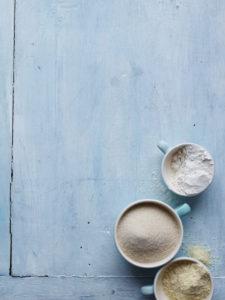 With recent research finding that fat may not be quite as unhealthy as we have been made to believe, sugar has become the new food enemy. Yet we like to eat sweet things. And why shouldn’t we have a treat now and again?
With recent research finding that fat may not be quite as unhealthy as we have been made to believe, sugar has become the new food enemy. Yet we like to eat sweet things. And why shouldn’t we have a treat now and again?
However, most of us are eating too much sugar. Sugar is energy rich and nutrient poor. The only time it is really necessary is for those with insulin dependent diabetes who need it to treat a hypo. Sugar makes up on average 12% of our diet, with the most Britons consuming 140 teaspoons per week and it’s seen as one of the main causes of the current obesity epidemic.
Action On Sugar is campaigning for a 5% recommended maximum, and the World Health Organisation suggest a perhaps more realistic 10%. A recent BBC programme ‘The Truth About Sugar’ gave a fascinating overview of sugar, revealing that it’s not just biscuits, cakes and sweets we should be limiting. There are a lot of hidden sugars in ready meals and processed foods. The recommended amount of sugar is 5 teaspoons a day, and a small serving of baked beans contains around 3 teaspoons. So it’s easy to see how quickly it adds up. Even supposedly healthy foods such as cereal bars are very high sugar – some have as much as 42%.
Which sugar?
Honey, glucose, sucrose, brown sugar, white sugar? It doesn’t matter. There’s almost no difference in the number of calories. So should we be turning to artificial sweeteners to satisfy our desire for sweet things? Are they safe or do they also pose a threat to our health?
Research into the use of sweeteners has been mixed. A 2008 study from the University of California San Diego used MRI scans to monitor the human brain’s reaction to diet soft drinks. Volunteers’ brains reacted differently to sugary water than to water with sweeteners added. The sweeteners were thought to trigger an increase in appetite without doing anything to satisfy it, making it more likely for us to follow a diet drink with something more calorific. Another study following a large population over ten years found that those who drank diet soft drinks were 65% more likely to become overweight over the next 7 or 8 years.
But in the absence of any clear evidence to prove that sweeteners are unsafe, we can’t see a problem with using them a little. Artificial sweeteners are very strong which means we only need to use a very small amount. There are many different types of artificial sweeteners including Aspartame, Acesulfame-K, Saccharin, and Sucralose.
There are also natural, no calorie sweeteners such as stevia. Stevia is derived from the stevia plant, related to the daisy and ragweed, and native of South America. It is approved for use by various Food and Agriculture organisations. It is 300 times sweeter than sugar and can be used in baking.
So what’s the answer? As always, it’s ‘everything in moderation’. It’s more a matter of reducing your need for sugar than just substituting it in your diet with a sweetener. It is probably best to gradually ween yourself off having sweet things in your diet, just using sugar or sweeteners very occasionally. Where you can, stick to the naturally occurring sugars found in fruits and try to cook from scratch where possible, that way you can be sure of what’s in your food. Happy cooking!
The BBC’s ‘The Truth About’ series included programmes about fat, calories, and sugar The Truth About Sugar.
http://www.bbc.co.uk/programmes/b05n2bn7
This article first appeared in Desang Diabetes Magazine, our free-to-receive digital journal. We cover diabetes news, diabetes management equipment (diabetes kit) and news about food suitable for a diabetic diet. Go to the top of this page to sign up – we just need your email address.



